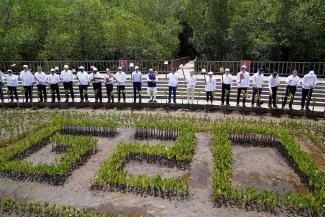Global governance
G20 leaders are “not in a state of denial”

We are living in multiple crises, and inflation is compounding all other problems. In a way, inflation is also a response to those crises because it is redistributing purchasing power and thus resources, though in an unplanned and uncoordinated way. The G20 declaration shows awareness of the problems and encourages central banks to manage the situation. To me, this message is confusing because central banks are now in a kind of race to raise interest rates, trying to keep their respective currencies competitive and make other countries bear a greater burden (see André de Mello e Souza on www.dandc.eu). The G20 was launched in 2008 to coordinate macroeconomic policy. Is the group shying away from that task?
No, I do not think so. My impression is that all policymakers involved understand that the current polycrisis is more complex than they used to assume. Covid-19, the war in Ukraine, the economic slump, food shortages, global warming, the dwindling of biodiversity and inflation reinforce one another in ways that make them almost intractable. After the summit, I am actually a bit more optimistic than I was before. I find it encouraging that the world’s most important governments are not in a state of denial and have done a lot to find common ground.
But that does not add up to a strategy to control inflation.
Well, there is only so much a group of 20 governments can do. Two things are driving up prices:
- One is the return to normal monetary policy after years of super-cheap money. Ever since the financial crisis of 2008, central banks of high-income countries had kept interest rates extremely low. The policy was called quantitative easing and it served to stimulate sluggish economies. Loose monetary policy, of course, makes asset prices rise, with eventually inflation increasing. It was obvious that it would take off sooner or later, and now it has.
- This development was triggered – and exacerbated – by real-economy shocks. One was the coronavirus pandemic which severely disrupted supply chains. Another one was Russia’s invasion of Ukraine, which drove up food and energy prices. You can also count increasingly devastating extreme-weather events as real-economy shocks too. On the demand side, consumption, which was subdued in the pandemic, has resumed, especially among high income groups.
So we are now living in a perfect storm. In this setting, it makes sense for the summit declaration to reiterate the role of independent central banks and call for vigilance.
But don’t we need more?
You cannot expect a two-day summit of heads of state and government to sort out everything, especially as they really are not close allies, but competitors and even adversaries. A big contradiction is that they all know that international cooperation is necessary, but they also feel the pressures of decoupling and de-globalisation. The sense of rivalry among them has grown, and there is an international trend towards more regional and national decision-making. It is therefore promising that Joe Biden and Xi Jinping had a long bilateral meeting in Bali. It shows an interest in cooperation in spite of many disagreements. It is equally encouraging that the declaration mentions all of the big problems that must be solved. Even though Russia is a G20 member, for example, the declaration spells out that the war in Ukraine is compounding macroeconomic problems. It also states that threats to use nuclear weapons are unacceptable in the eyes of most participants. The language of the statement is surprisingly clear.
Acknowledging that the war adds to macroeconomic problems does not end the war – and it does not reduce the problems.
No, it does not, but that is the most the G20 was able to do. It is ultimately an informal setting with a macroeconomic mandate. It really can only express intentions and, if things go well, coordinate policies to make them come true. In terms of intentions, important global goals were reconfirmed, including food security, the mitigation of climate change, the protection of ecosystems, the stability of the financial architecture, the rule-based trade order, inclusive growth and so on. The document includes a commitment to speed up action towards achieving the Sustainable Development Goals. It also points out that women, smallholders, youth and vulnerable groups deserve particular attention, so no one gets left behind.
The declaration also calls for new investments to promote related causes – from eco-friendly infrastructure and clean energy to better pandemic preparedness through to education and waste management. But it does not say where the money will come from, apart from hints that the private sector must play a role and multilateral institutions should be involved. Isn’t the greatest problem we face today that all nations lack the fiscal space they need? I think the declaration says too little about related topics, from taxes to climate finance to sovereign debt.
I empathise with your wish to see a grand global plan. However, the lack of it does not amount to an unwillingness or an inability to respond to problems. The G20 are doing so in incremental steps. The declaration endorses OECD efforts to improve international cooperation on raising taxes and stemming tax avoidance, and it refers to the UN summit on development finance in Addis Ababa in 2015, which emphasised that developing countries must improve their tax system to mobilise domestic resources.
It may look piecemeal, but don’t forget, the G20 are a club of 20 powerful but competing governments. They really cannot do much more than to support – and perhaps strengthen – existing international and multilateral initiatives. In regard to the fiscal space of least developed countries (LDCs), moreover, the G20 actually did take important steps. G20 members are increasingly allowing LDCs to use for developmental purposes special drawing rights (SDRs) which belong to the G20 members. SDRs are an internal IMF monetary reserve asset. They are distributed according to each member’s quota proportion at the IMF. The Fund issued new SDRs in 2021 to ease fiscal constraints in the pandemic and distributed them according to countries’ quota of IMF shares, so the high-income countries got much more than the LDCs. It is promising that G20 members are becoming less hesitant to letting LDCs use those assets (also see Kathrin Berensmann on www.dandc.eu).
What about climate finance?
Well, the declaration does reiterate that all existing promises must be fulfilled. It also indicates that more is needed. From the Indonesian perspective, the deal to phase out the country’s coal-fired power stations in the next 10 years was most important. It was concluded in the context of the summit but does not feature in the declaration. The deal is worth $ 20 billion and includes support from the EU, other G20 partners and the private sector. A similar deal was concluded with South Africa last year, and another one is planned with Vietnam. These are all sensible steps in the right direction.
My hunch is that sovereign debt issues, which are getting worse in many places, deserved more attention.
But the declaration does take account of them. It explicitly mentions the cases of Zambia, Chad and Ethiopia, where it appreciates the stance taken by the IMF. It also expresses concern for debt problems increasing in middle-income countries – and all of this reveals a willingness to act eventually. Without the suspension of least developed countries’ debt servicing during the pandemic, the situation would be much worse today. The G20 made the suspension happen.
Isn’t the real problem that the G20 do not agree on what to do regarding debt restructuring. China has a pattern of extending, but not forgiving loans. Some policymakers of high-income countries accuse Beijing of ensnaring LDCs in debt traps. In many ways, Chinese lending has resembled development lending by established donors in the 1970s or 80s, focusing on infrastructure in the hope of triggering growth, but ultimately leading to over-indebtedness. Obviously, the governments of high-income countries are not fond of debt relief either, but, unlike China, they have the experience of how useful multilateral debt relief was around the turn of the millennium.
Yes, those are interesting issues, but I think the strong point of the G20 summit was that it did not relitigate the past. So if western governments had started admonishing China for its lending, China could have responded by complaining about quantitative easing. It was wise to stay away from blame games and look forward instead.
Iwan J. Azis is a professor at Cornell University in Ithaca, New York, and visiting professor at the University of Indonesia in Jakarta. He served as a research advisor to the Indonesian central bank, participating in several pre-G20 seminars.
http://iwanazis.com/














